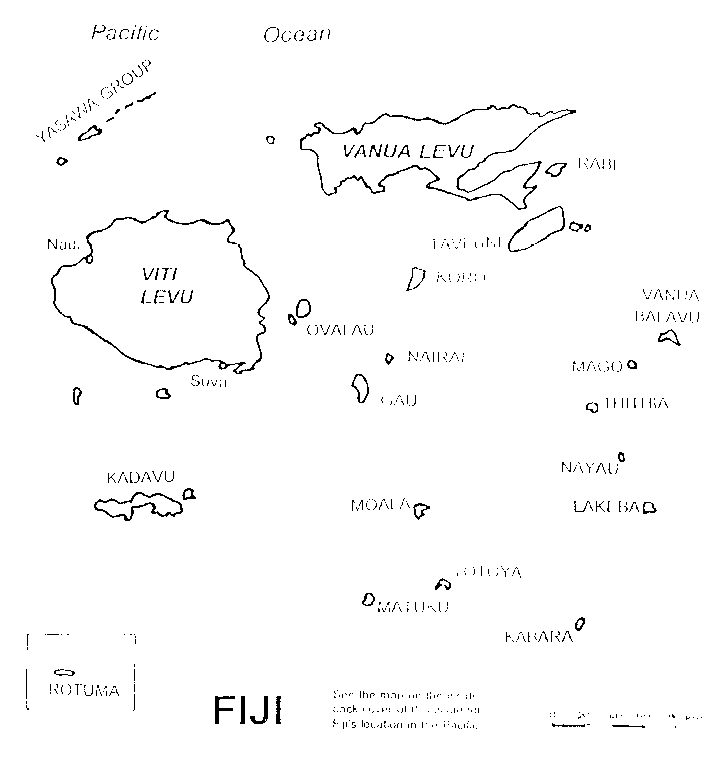Profile
General information
Area: 18 272 km². Fiji has two main islands (Viti Levu and Vanua Levu) and about 300 smaller ones. It has an Exclusive Economic Zone of approximately 1.3 million km²).
Population: 790 000
Population density: 43 per kilometre²
Capital: Suva (situated on the island of Viti Levu)
Main languaqes: English, Bauan
(main Fijian language)
Currency: Fiji dollar (F$). In June 1996, 1 ECU was worth approximately F$ 1.80. (US$1 = F$ 1.40)

Fiji
Politics
System of government: A bicameral parliamentary system consisting of an appointed Senate and an elected House of Representatives. The President is a non-executive head of state chosen by the Great Council of Chiefs. The President appoints the Prime Minister.
Under the Constitution, adopted in 1990, the Parliament is divided along racial lines. The Senate has 34 members, 24 of whom are indigenous Fijians. In the 70-member House of Representatives, 37 seats are reserved for native Fijians, 27 for Indo-Fijians, 5 for 'general voters' (other ethnic groups) and 1 for Rotuma Island (whose inhabitants are Polynesian). The 1990 Constitution provides for a review within seven years and discussions are currently under way with a view to amending the Constitution by the 1997 deadline.
President: Ratu Sir Kamisese Mara
Prime Minister: Major General Sitiveni Rabuka
Main political parties: Soqosoqo ni Vakavulewa ni Taukei (SVT - Fijian), National Federation Party (NFP - Indian), Fiji Labour Party (FLP - Indian), Fijian Association (FA - Fijian), General Voters Party (GVP).
Party representation in Parliament (1994 election result): SVT 31, NFP 20, FLP 7, FA 5, GVP 4, Others 3.
Economy
GDP: (1995) F$ 2.85 billion
Annual GDP per capita: approx US$ 2600
GDP growth rate (1995): 2.2% (2.9% predicted for 1996)
Principal exports (1994): Sugar (US$ 182m), Garments (US$ 96m), Gold (US$ 43m), Fish (US$ 38m), Timber (US$ 21 m) Main trading partners (in order of importance):
Exports - Australia, UK, USA, Japan, New Zealand.
Imports - Australia, New Zealand, USA, Japan, Singapore.
Trade balance (1994): exports - US$ 547m, imports - US$ 826, deficit - US$ 279m. The current account figures also usually reveal a deficit but this is much smaller due to tourism earnings and official transfers.
Inflation rate (1995): 2.2%
Government budget (1996): revenue - F$ 759m, expenditure - F$ 851 m, deficit - F$92 (about 3.5% of GDP)
Forma/sector employment: 98 112 (out of a total economically active population of about 265 000)
Social indicators
Life expectancy at birth (1993): 71.6 years
Adult literacy (1993): 90.6%
Enrolment in education: all levels from age 6-23: 79%
Human Development Index rating: 0.853 (47th out of 174)
Sources: Economic Intelligence Unit, UNDP Human Development Report, 1996, EC Commission.

















































